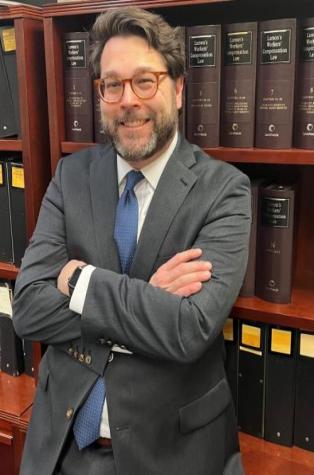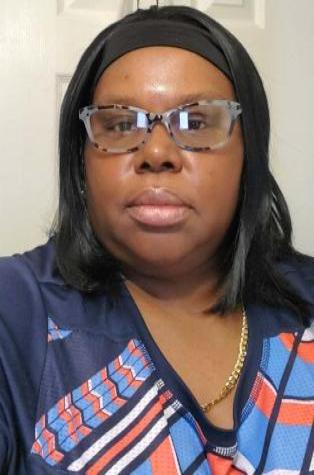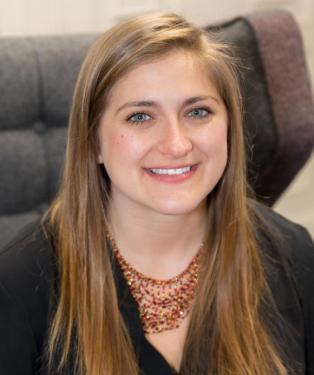All current SOL employees are eligible to volunteer or suggest coworkers to feature on this page by emailing SOL Webmaster with the subject heading “Employee Spotlight Suggestion.” Please include the employee’s name, email address, phone number, job description (administrative staff, technical support, trial attorney, supervisor, etc.), Region or Division, and a few sentences explaining why the employee should be featured in a future edition of the SOL Employee Spotlight.
Are you a student, attorney, paralegal, or other administrative professional interested in joining SOL? Please visit the SOL Job Opportunities page at https://www.dol.gov/agencies/sol/careers. If you have questions about what it’s like to work as an attorney in SOL, please contact one of our SOL Ambassadors listed at https://www.dol.gov/agencies/sol/careers/ambassadors.
William Bush

Senior Attorney, Black Lung and Longshore Legal Services Division (National Office)
I have worked in the division of Black Lung and Longshore Legal Services for five years; before that, I was a consultant for the Office of Administrative Law Judges and a staff attorney at the Benefits Review Board. I graduated from the Washington & Lee University School of Law in 2014, so this is my ten-year anniversary as a practicing attorney! I grew up in southwestern Pennsylvania but spent my twenties in Minneapolis, Minnesota, which came to feel a lot like home. Before law school, I was a college writing instructor.
Describe the kind of work you did before you came to the Department of Labor.
Between two stints at the Department of Labor, I worked briefly for a firm that specialized in plaintiff-side employment law, specifically class and collective wage and hour litigation.
What is a typical day in your position like?
My litigation practice is all appellate, so I get to spend at least half of every day researching, writing, and revising a substantive legal argument. The rest of the time, I’m advising my client agency, preparing my own oral arguments or helping my colleagues to prepare for theirs, and evaluating cases in my program areas for potential participation by the Department.
What is your favorite part of your job?
My division is both rigorous and supportive. We take pride in our high-quality work product, but we never lose sight of the fact that we’re human beings with lives outside of work. There’s a real combination of dedication to public service, talent, and camaraderie here.
Describe an interesting case you worked on recently.
All of my cases are interesting! I think the key to enjoying appellate litigation is to find a way to get really fascinated with some aspect of the case or the issues it involves. That said, I recently filed a brief in the United States Court of Appeals concerning whether a federal workers’ compensation program can require reimbursement for medical marijuana. It’s my favorite kind of case—one of first impression. I’m always surprised and delighted when someone asks a question that hasn’t come up before—and it happens at DOL more than I thought it would.
Geneva Rackley-Gaud

Paralegal Specialist, New York (Regional Office)
I have been working for SOL in the New York Regional Office for more than 35 years. I am married with two daughters and two grandchildren. Before coming to SOL, I worked as a receptionist in private law in the Bronx. I decided to work for the Department of Labor because I knew my work ethic would make a difference in the lives of working families by safeguarding their wages, protecting their health and safety, and ensuring access to unemployment, health insurance, workers’ compensation, and retirement benefits by adhering to the mission of the office.
What path has your career at DOL taken so far?
My career path has taken so many twists and turns throughout my tenure. I started out as Clerk Typist, and I was promoted to five different positions before becoming a Paralegal Specialist. Also, I have gained experience in the administrative program area.
What is a typical day in your position like?
A typical day consists of the following:
- Assisting attorneys with trial preparation by organizing, photocopying, bates stamping, and assembling exhibits and formulating tables of contents and authorities.
- Drafting and filing pleadings and motions with the Occupational Safety and Health Review Commission.
- Responding to FOIA and vetting requests from the National Office.
- Redacting personally identifying information.
- Processing OSHA third-party subpoenas.
- Assisting with administrative and procurement projects.
What is your favorite part of your job?
My favorite part of my job is being of service to the community, which has helped me to align my personal and professional goals across the organization and focus on the mission of the office. Also, I like working independently and having the opportunity to manage work-life balance during and after the pandemic.
Thinking back to what you thought your job would be like when you applied for it, what is the aspect of the job that has surprised you the most?
What has surprised me the most is that I never thought it would be possible for all government employees to have the flexibility to balance their work and life through telework.
What advice do you have for those who may be considering applying for a position like yours in SOL?
If anyone is considering applying for a professional position in the government, these are the top five skills you should have:
- Multitasking
- Working both independently and as part of a team
- Working well under pressure
- Maintaining a professional attitude
How do you like to spend your time outside of work?
Outside of work, I spend my time shopping, reading, watching different sporting events, going to concerts, and traveling. My mother played basketball when she was in school; I guess that’s why I like watching it as much as I love playing it and going to see games in person.
Marisa Schnaith

Senior Attorney, Occupational Safety and Health Division (National Office)
I joined SOL in fall 2017 through the Honors Program and then placed permanently in the OSH division in fall 2019. I graduated with a B.A. from Miami University in Ohio in 2009 and received my J.D. from Harvard Law School in 2015. Before law school, I served in the Peace Corps in Mongolia. In addition to my OSH work, I have also been one of the co-coordinators of the SOL Pro Bono Program since summer 2020. I actually met my husband, a fellow SOL employee, while doing pro bono work!
Describe the kind of work you did before you came to the Department of Labor.
Before joining DOL, I clerked for a year in Los Angeles on the Central District of California, and then for a year in Denver on the Tenth Circuit Court of Appeals.
How did you decide you wanted to work for the Department of Labor?
I always knew I wanted my career to focus on public interest work of some kind, but I was pretty open to what that might be. DOL came on my radar while I was clerking in Los Angeles, when I worked on a DOL trial involving retaliation and other violations of ERISA. It was one of the most interesting cases I worked on all year, and seeing the power of the government used to (successfully) defend workers who had experienced unlawful retaliation for trying to do the right thing inspired me to apply to DOL after clerking.
Describe an interesting case/project you worked on recently.
Over the last two years, I have been the lead attorney in OSH working with OSHA to develop and implement a new program to provide U and T visa certifications to immigrant workers who have been the victims of trafficking or other qualifying crimes. The workers can then use those certifications to apply for U or T visas from USCIS, which, if granted, provide the worker important benefits and security, including legal work authorization. OSHA officially rolled out their program on March 30, 2023. This program has the potential to provide direct support to countless immigrant workers who are often working in some of the most hazardous jobs and who may be particularly vulnerable to exploitation by unscrupulous employers. I am so glad I have had the opportunity to be part of this impactful work.
What has been your favorite pro bono experience?
As noted above, I have been co-leading the SOL Pro Bono Program since summer 2020, and I’ve been volunteering to do a variety of pro bono work since I started at DOL in 2017. I’ve tried lots of different things—representing a tenant in an eviction proceeding; providing brief legal advice at various clinics; judging moot court competitions; assisting elderly clients with DC tax filings; preparing expungement petitions—but if I had to pick a favorite, it would have to be volunteering with the Whitman Walker Name and Gender Change Clinic. Through that clinic, I have had the pleasure of working with dozens of clients to update their legal names and gender markers. I love the opportunity this clinic gives me to work directly with clients and have a tangible impact on their lives. We have a really robust pro bono program at DOL, which is awesome because it gives SOL attorneys an avenue to develop different legal skills and have that direct client interaction that we do not typically get in our day-to-day work. (And it sometimes comes with a bonus of introducing you to your future spouse!)
